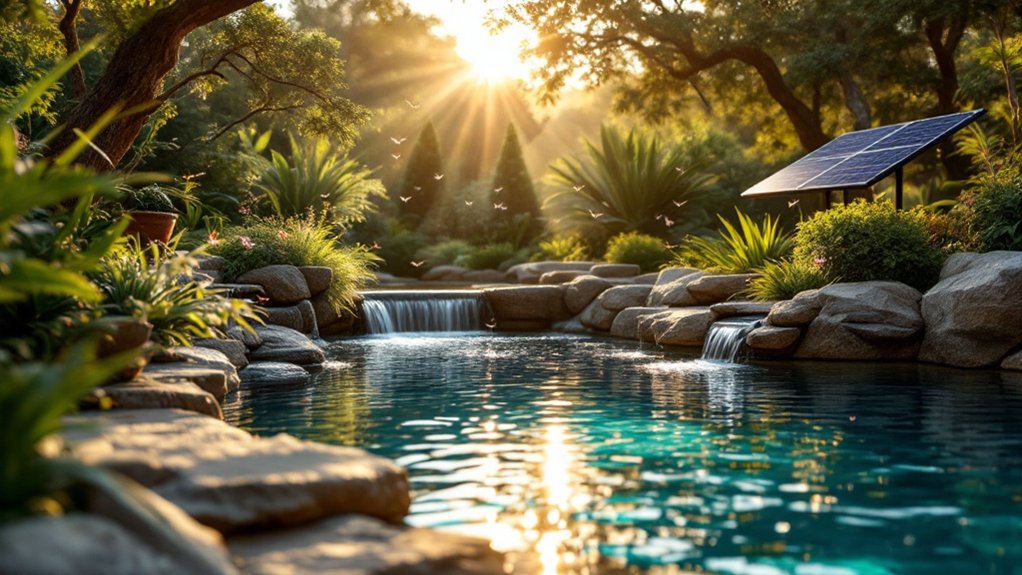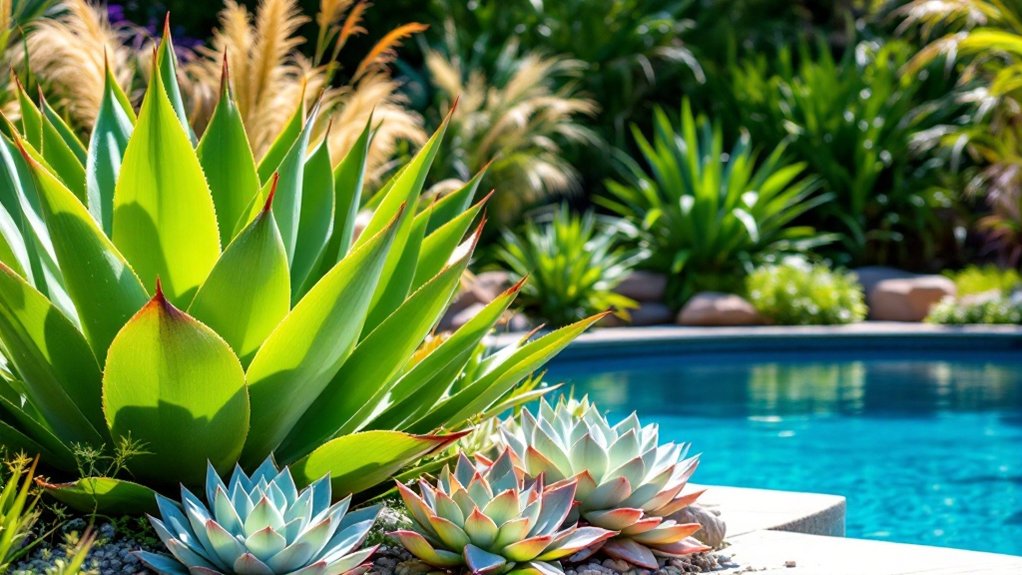As environmental concerns grow, pool owners are increasingly turning to biodegradable cleaners. These products offer an eco-friendly alternative to traditional chemicals, promoting healthier swimming environments. Leading brands such as EcoPool and GreenClean are at the forefront, utilizing natural ingredients to combat contaminants. However, not all biodegradable options are created equal. Understanding how to choose the right cleaner is essential for sustainable pool maintenance. What factors should be considered in this decision?
The Benefits of Biodegradable Pool Cleaners
Although many pool owners prioritize cleanliness, the environmental impact of traditional pool cleaners often goes overlooked. Biodegradable pool cleaners offer a sustainable alternative, reducing harmful chemicals released into water systems. These products break down naturally, minimizing pollution and promoting healthier ecosystems. Additionally, they are less likely to irritate skin or eyes, ensuring a safer swimming experience for families and pets. The use of biodegradable cleaners can also enhance water quality without compromising on cleanliness, making them an effective choice for maintaining pools. Moreover, by selecting eco-friendly options, pool owners contribute to a broader movement towards sustainability, demonstrating environmental responsibility. Ultimately, biodegradable pool cleaners provide a balance between cleanliness and ecological health, making them a wise choice for conscientious consumers.
Top Biodegradable Pool Cleaner Brands
As the demand for eco-friendly products grows, several brands have emerged as leaders in the biodegradable pool cleaner market. One such brand is EcoPool, known for its plant-based formulas that effectively break down organic contaminants without harming aquatic life. Another significant contender is GreenClean, which specializes in natural enzyme-based cleaners that not only purify water but also maintain pool surfaces. Crystal Blue offers a unique blend of biodegradable ingredients that target tough stains while being safe for the environment. Finally, BioGuard stands out with its extensive range of eco-friendly cleaners designed for various pool types. These brands exemplify the commitment to sustainability while ensuring pool owners can maintain clean and healthy swimming environments.
How to Choose the Right Biodegradable Pool Cleaner
When selecting the right biodegradable pool cleaner, what factors should one consider to guarantee peak performance and environmental safety? First, it is essential to evaluate the ingredients, ensuring they are plant-based and free from harmful chemicals. Second, consider the specific type of pool—above-ground or in-ground—as some cleaners are formulated for particular systems. Additionally, one should assess the cleaner’s effectiveness against common contaminants such as algae, bacteria, and debris. Compatibility with existing pool maintenance products is another critical factor. Finally, read customer reviews and check for certifications that validate the product’s environmental claims. By taking these considerations into account, individuals can make informed choices that balance cleaning efficiency with ecological responsibility.
Comparing Effectiveness: Biodegradable vs. Traditional Cleaners
The effectiveness of biodegradable pool cleaners compared to traditional options warrants careful examination. Factors such as cleaning power, environmental impact, and cost-effectiveness play vital roles in determining the best choice for pool maintenance. Analyzing these aspects can provide valuable insights for consumers seeking eco-friendly solutions.
Cleaning Power Comparison
While traditional pool cleaners have long been favored for their powerful formulations, a growing interest in biodegradable options raises questions about their effectiveness. Research indicates that biodegradable cleaners can effectively remove dirt, debris, and algae, though they may require more frequent application compared to their chemical counterparts. The active ingredients in these eco-friendly cleaners often focus on natural enzymes and plant-based surfactants, which can work efficiently but might take longer to show results. Conversely, traditional cleaners typically utilize harsher chemicals that promise immediate and robust cleaning power. Pool owners often report variable results with biodegradable products, highlighting the need for proper dosage and technique to achieve peak cleanliness. Ultimately, the choice may depend on personal priorities regarding health, safety, and environmental considerations.
Environmental Impact Analysis
Environmental impact emerges as an essential factor in the debate between biodegradable and traditional pool cleaners. Biodegradable cleaners are formulated using natural ingredients that break down more quickly in the environment, minimizing long-term ecological effects. In contrast, traditional cleaners often contain harsh chemicals that can lead to water pollution and harm aquatic life. Studies indicate that the runoff from these conventional products can contribute to algal blooms, which deplete oxygen levels in water bodies. Additionally, the production and disposal of traditional cleaners may result in significant carbon emissions. Consequently, while both types serve the same purpose, the environmental implications of their use differ markedly, with biodegradable options generally posing a lesser threat to ecosystems and promoting sustainability in pool maintenance practices.
Cost-Effectiveness Assessment
Cost-effectiveness in pool maintenance is increasingly coming under scrutiny, particularly when comparing biodegradable and traditional cleaners. While traditional cleaners often boast lower upfront costs, they may require more frequent applications due to their harsher chemicals, potentially leading to higher long-term expenses. Conversely, biodegradable cleaners, although typically more expensive initially, offer sustainable benefits that can lead to cost savings over time. These products tend to be gentler on pool equipment and the environment, reducing the likelihood of costly repairs and chemical-related issues. Additionally, eco-conscious consumers may find value in the reduced environmental impact, which can translate to improved brand loyalty and marketability. Consequently, a thorough cost-effectiveness assessment reveals that the choice extends beyond price, incorporating longevity and environmental considerations.
Tips for Maintaining a Sustainable Pool
Maintaining a sustainable pool requires a focus on eco-friendly practices and the use of chemical alternatives. By implementing green maintenance strategies, pool owners can reduce their environmental impact while still enjoying a clean swimming environment. An overview of these alternatives highlights effective options that align with sustainable living.
Eco-friendly Maintenance Practices
How can pool owners guarantee their maintenance practices are both effective and eco-friendly? First, regular cleaning with biodegradable pool cleaners guarantees water quality while minimizing environmental impact. Utilizing energy-efficient pumps and timers can greatly reduce energy consumption, promoting sustainability. Additionally, employing natural filtration systems, such as plants or sand filters, can enhance water clarity without harmful chemicals. Monitoring water levels and avoiding overfilling helps conserve water resources. Moreover, pool owners should embrace solar covers, which retain heat and reduce evaporation, thereby saving energy. Finally, scheduling routine maintenance checks can identify potential leaks or issues early, guaranteeing the pool operates efficiently while preserving resources. By incorporating these eco-friendly practices, pool owners can maintain beautiful, sustainable swimming environments.
Chemical Alternatives Overview
While traditional pool chemicals can effectively keep water clean, many pool owners are now exploring chemical alternatives that prioritize environmental sustainability. Options such as saltwater systems, which use electrolysis to generate chlorine from salt, reduce reliance on harsh chemicals. Additionally, natural enzymes and mineral-based solutions can help break down organic matter without introducing toxic substances.
Some products utilize coconut-based surfactants or plant-derived ingredients, offering effective cleaning without harming aquatic life. Ultrasonic pool cleaners are also gaining popularity, using sound waves to eliminate contaminants while minimizing chemical use. By integrating these alternatives, pool owners can maintain clean and safe swimming environments while greatly reducing their ecological footprint, aligning leisure with responsible environmental practices.
Customer Reviews and Experiences With Biodegradable Cleaners
What do customers think about biodegradable pool cleaners? Many users express satisfaction with the effectiveness of these environmentally friendly products. They appreciate that biodegradable cleaners not only maintain pool cleanliness but also minimize environmental impact. Reviews highlight features such as ease of use and pleasant scents compared to traditional chemical cleaners. Customers often report that these products are safe for children and pets, which adds to their appeal. However, some users mention that biodegradable options may require more frequent application to achieve desired results. Overall, the feedback indicates a growing preference for sustainable cleaning solutions, with many customers willing to compromise on convenience for the sake of the environment. The positive reception underscores a shift towards eco-conscious pool maintenance practices.
Frequently Asked Questions
Are Biodegradable Pool Cleaners Safe for All Pool Types?
The question of safety regarding biodegradable pool cleaners for various pool types remains pertinent. Generally, these cleaners are formulated to be safe for most pool materials; however, individual compatibility should always be verified with manufacturers to guarantee peak performance.
How Long Do Biodegradable Cleaners Take to Break Down?
The time it takes for biodegradable cleaners to break down varies widely, typically ranging from a few weeks to several months, depending on environmental factors such as temperature, moisture, and microbial activity present in the pool ecosystem.
Can I Use Biodegradable Cleaners With Chlorine Pools?
Biodegradable cleaners can generally be used in chlorine pools without issues. However, it is advisable to check product specifications and compatibility, as some formulations may interact with chlorine, affecting their effectiveness and overall pool chemistry.
Are There Any Allergens in Biodegradable Pool Cleaners?
The presence of allergens in biodegradable pool cleaners varies by product. Some formulations may contain natural ingredients that trigger sensitivities, while others aim to minimize allergens. It’s advisable to read labels and consult manufacturers for specific concerns.
How Do I Dispose of Leftover Biodegradable Cleaner?
To dispose of leftover biodegradable cleaner, one should follow local regulations. Typically, it can be diluted with water and poured down the drain, or composted if labeled safe, ensuring it poses no environmental risks.
Conclusion
To summarize, selecting biodegradable pool cleaners not only promotes a cleaner swimming environment but also supports eco-friendly practices that benefit aquatic ecosystems. With leading brands like EcoPool, GreenClean, and Crystal Blue, pool owners have access to effective, sustainable solutions for their maintenance needs. By prioritizing these environmentally conscious products, individuals can enjoy their pools while contributing to a healthier planet, making a responsible choice that aligns with their values of sustainability and environmental stewardship.




